- Army
- Air Defense Systems
- Anti-tank systems and vehicles
- Armored Vehicles
- Armoured personnel carriers
- Artillery Vehicles and Weapons
- Command Post
- Communication Vehicles and Systems
- Electronic Warfare
- Engineer | Maintenance Vehicles
- Infantry Fighting Vehicles
- Main Battle Tanks
- Missiles
- Tactical and Logistic Vehicles
- Radars
- Unmanned Systems
- Weapons
- Navy
- Air
Jackal 2 Supacat
Jackal 2 Supacat
Force Protected Patrol Reconnaissance and Tactical Vehicle - United Kingdom
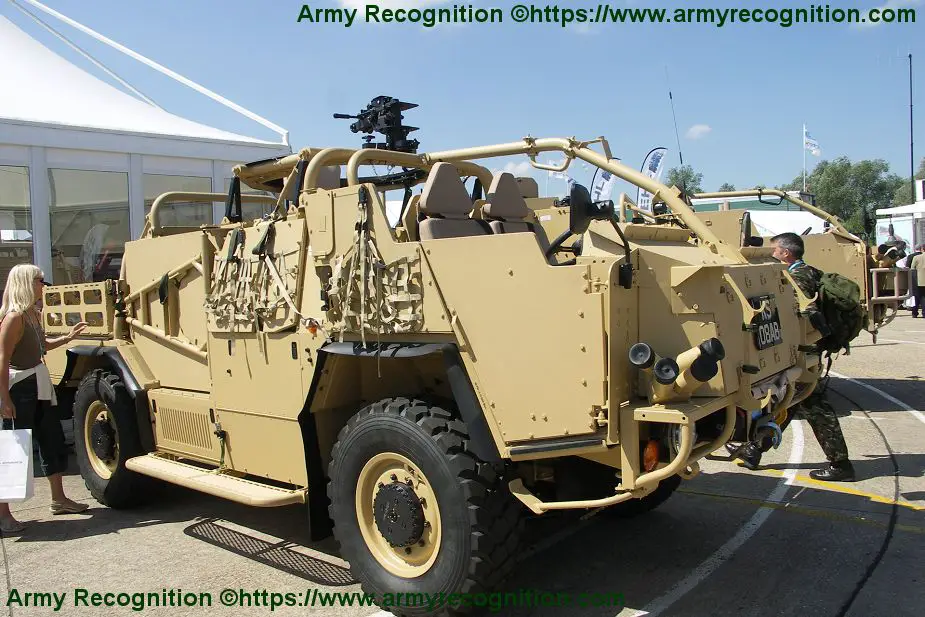
Description
The Jackal 2 is a high mobility weapons platform, with a unique air-bag suspension system allowing rapid movement across varying terrain. Used for reconnaissance, rapid assault, fire support and convoy protection. The Jackal 2 has the capacity to support itself and its crew over 800km. Designed by Supacat and built by BABCOCK, approx 110 Jackal 2 Vehicles have been bought by the MoD as part of the Protected Mobility Package. Jackal 2 has undergone several upgrades from its predecessor, which although subtle, will give the driver and passengers more safety and an improved strategic advantage on the battlefield according to the engineers. Late in 2009 Jackal 2 will enter frontline service. It will provide enhanced levels of crew protection, reliability, maneuverability and capacity. The Jackal 2 can carry increased payload and fuel compared to the Jackal 1, allowing it to carry greater amounts of additional equipment and protection over long distances.
Jackal 2 variants:
- No variants at this time
Technical Data
| Armament |
|
Jackal 2 is armed with General Purpose Machine Gun (GPMG SF) as crew protection and can carry either Heavy Machine Gun (HMG) or Grenade Machine Gun (GMG) as the main weapon system in the fire support role. The .50 caliber machine gun has been depressed to give the operator more flexibility and to ensure that the driver is affected less by the noise.
|
| Design and protection |
|
The blast protection and the small arms fire protection of the new Jackal 2 have been enhanced with new blast shields under the driver and navigator cockpit, which also have seats protected by side and back armor. The floor of the vehicle will have more blast plates and the passenger seats will have steel plates underneath and on their backs. Engineers believe that this will allow the vehicle to withstand IED blasts. In the rear of the vehicle, there will now be space to carry additional fuel, ammunition or the equipment used by personnel. The Jackal 2 can now carry four soldiers, one more than the Jackal 1.
|
| Mobility |
| The chassis of the Jackal 2 has been upgraded allowing the vehicle to carry a greater load and give it greater strength—vital if a vehicle is to survive the blast from a roadside bomb. A larger 6.7-liter engine Cummins replaces the original vehicle’s 5.9 liters Cummins ISBe Euro3, although this does not increase the speed of the vehicle. The Jackal can travel approximately 1000 km on a single tank of fuel. On regular roads, its top speed will be 130 km/h while in off-road conditions it can travel at up to 90 km/h. |
| Accessories |
| The Jackal 2 can be fitted with the BOWMAN communications equipment. |
Specifications
| Armament | Armor |
| 7.62 GPMG, 12.7mm Heavy Machine Gun or 40mm Grenade Machine Gun | Blast and Ballistic protection |
| Country users | Weight |
| United Kingdom | 6,650 kg |
| Designer Country | Speed |
| United Kingdom | 130 km/h |
| Accessories | Range |
| Bowman communication system | 1,000 km |
| Crew | Dimensions |
| 2 + 4 | Length: 5.79 m; Width: 2.05 m; Height: 2.44 m maximum |
Details View
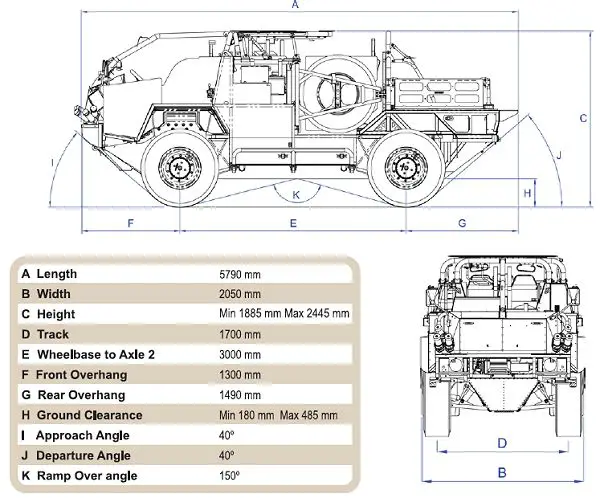 |
|
| a | |
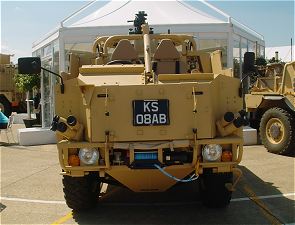 |
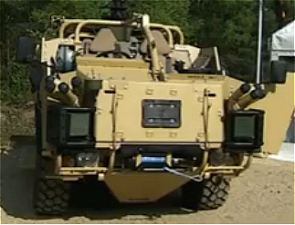 |
| a | |
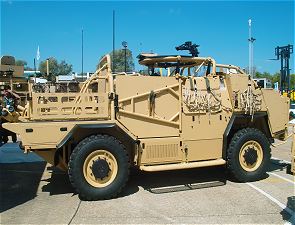 |
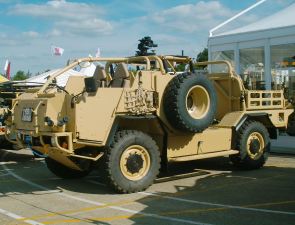 |
Pictures - Video



























